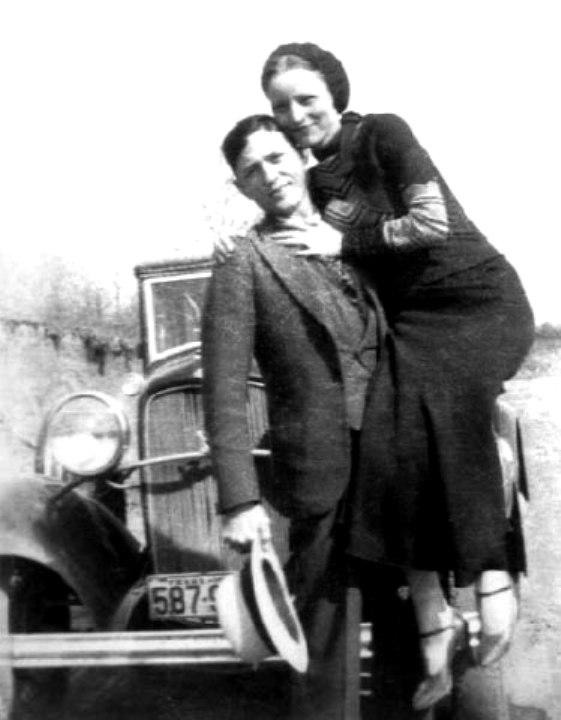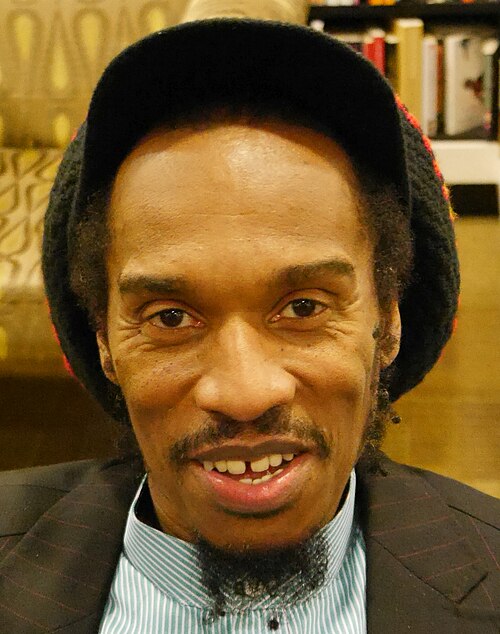 Blanche Barrow
Blanche Barrow
This was Blanche Barrow in late 1933. Twenty-two years old. An inmate in the Missouri State Penitentiary. Something is wrong with her left eye.
Blanche grew up poor in Oklahoma and Texas. Little schooling. Her last job was washing hair in a beauty salon. She was married to Buck Barrow, 30, from a poor farming family in Texas; he had a criminal background. Buck, now dead, was a member of his 24-year-old brother Clyde’s gang that robbed banks and stores and shot anybody that got in their way.
For upwards of two years, Clyde and his lover Bonnie Parker—22, grew up poor in Texas, a waitress—were famous, in all the newspapers. Bonnie and Clyde, everybody knew them by their first names. Bonnie’s poems, surprisingly good, and snapshots of her with a rifle and smoking a cigar, were on front pages. Outlaws, adventurers, on the run from the publicity-conscious FBI until they were riddled with bullets in a May 23rd 1934 FBI ambush as they drove along a rural Louisiana road on their way to see relatives. Here are the two of them. Bonnie and Clyde
Bonnie and Clyde
And here’s Blanche and Buck.
 Blanche and Buck
Blanche and Buck
In a May, 1933, shootout with the law in Missouri, Buck was shot in the head and both Blanche’s eyes were injured by shards of bullet-shattered car window glass leaving her completely blind in her left eye.
Bonnie, Clyde, Blanche, and Buck made it to Iowa before they were tracked down by the FBI and a posse of locals. Buck died of his head wound and a second shot and Blanche was arrested. Bonnie and Clyde escaped, postponing their demise for another year. Blanche was sentenced to ten years in prison for assault with intent to kill.
Bonnie and Clyde have become part of American history, folk heroes of a sort. Bonnie had pizzazz. Depression-era have-nots who went for it big and literally went out with a bang. Like so many others, I’ve been fascinated by their story over the years.1
Two weeks or so ago, I read Blanche’s book about her time with Bonnie and Clyde. Up until then, I hadn’t known about her book. She authored her story during her years in prison, from 1933 until she was paroled in 1939. In loose-leaf notebooks, mostly hand-written in ink, a bit in pencil, stream-of-conscious unpunctuated prose. Blanche wrote it just for herself and set it aside, and it wasn’t until well after her death in 1988 that John Neal Phillips edited what she’d put together and published it in 2005 as a book with the title My Life with Bonnie and Clyde, with Blanche listed as the author and himself as the editor.2 I found the book and Blanche herself compelling. Both have stuck in my mind for days, and now I’m taking the time to write this post up.
Blanche is prominent in one of the biggest movies of the 1960s, “Bonnie and Clyde,” 1967, directed by Arthur Penn. In one of his very first reviews for the Chicago Sun-Times newspaper, famed reviewer Roger Ebert wrote:
Bonnie and Clyde” is a milestone in the history of American movies, a work of truth and brilliance. It is also pitilessly cruel, filled with sympathy, nauseating, funny, heartbreaking, and astonishingly beautiful. . . . Years from now it is quite possible that “Bonnie and Clyde” will be seen as the definitive film of the 1960s, showing with sadness, humor and unforgiving detail what one society had come to.3
I’d never seen “Bonnie and Clyde,” and prompted by Blanche being in my thoughts, I streamed it and can affirm Ebert’s take on it. It is exemplary filmmaking. I watched it on the Criterion Channel, a subscription service, around $100 a year, that I highly recommend if you are a film buff—a superb collection of classic old films along with a smattering of well-chosen recent ones.
“Bonnie and Clyde” stars Warren Beatty as Clyde and Faye Dunaway as Bonnie. I’ve referred to ages as I’ve gone along here to underscore how young Bonnie and Clyde were—23 and 25 when they died—and now how much younger they were than the actors who portrayed them. Beatty was 29 during the filming and Dunaway was 26. Gene Hackman who played Buck was 37. Estelle Parsons, who played Blanche, was 40.
While I’m on the topic of contrasts, Clyde, Bonnie, and Blanche were smaller than you probably imagine them being: Clyde was 5’5”, Bonnie 4”10”, and Blanche 4’11”. Warren Beatty was 6’1”, Faye Dunaway 5’7”, Gene Hackman 6’2” (Buck was 5’7”), and Estelle Parsons was 5’4”. One of the people who viewed the bodies of Bonnie and Clyde when they were displayed for public viewing—they did that with prominent criminals in those days, John Dillinger a prime example—remarked, “Why, they’re just little bitty things.”
Estelle Parsons won the Academic Award for Best Supporting Actress for her portrayal of Blanche and deserved it. Here she is in the movie in a characteristic pose—she’s pitched in the movie as being given to hystrionics.
 Estelle Parsons
Estelle Parsons
I was struck by the difference between the Blanche that came across in her memoir and the image of her in the movie and it’s this and what I make of it that is the subject of this post.
In her memoir, Blanche is young, sincere, personally grounded, and deeply in love with, devoted to, and protective of her eight-years-older, somewhat-of-a-father-figure, husband Buck. Blanche in the movie is appealing in her vulnerability, especially after the eye injury, and her concern for Buck’s wellbeing comes through, but the predominant picture of her is as a chatty, shallow, shrill, inept, loose-cannon, hanger-on. After seeing the movie, the real Blanche was quoted as saying, “They made me look like a screaming horse’s ass.”
Reading the book and seeing the movie — and it’s been a theme in my writing recently4 — reminded me that what I know about the world and the people who live in it is shaped by those who mediate it for me, who show things to me and tell me about them and what they mean. I’m much more aware of that fact these years than I was before, and I wish I hadn’t been so late in coming to this realization
I’ll illustrate this point through this Blanche Barrow example. If I had just read her memoir, I’d think one thing about her. If I’d just seen the movie, I’d think something else. And now that I’ve both read her book and seen the movie, it’s yet another thing, and I think it’s a better thing. I have a more complex, nuanced, understanding of her, which includes what I’m not clear about with regard to her.
With that as an organizer, for the remainder of this writing, I’ll compare the Blanche in the movie and the Blanche in the book.
* * *
Consider these three segments of dialogue from the movie:
- Blanche enters the latest motel room on the gang’s run from the law.
“Look, it’s so clean, Buck. And a refrigerator, not an ice box. Oh, and about eight pounds of pork chops, four pounds of red beans, and some Chase and Sanborn coffee!”
“Buck, you need a haircut. You’re looking just like a hillbilly.”
“You’re like an old man playing checkers all the time. Paying no attention to your poor lonely wife.”
- Clyde looks out the window of the motel room. “It’s the cops!”
Blanche runs to the window. “He’s got a shotgun!” Aaah!! she screams. Get us out of here!”
A shootout with the police, Bonnie, Clyde, and Buck firing through the windows. Blanche is ducked down. “Aaah!”
The four escape out the back door. Clyde, Bonnie, and Buck jump into the car. Blanche runs off, arms waving, darting left and right. Clyde drives close to her, slows the car to a crawl, Buck opens the back door. Blanche runs to the car and jumps into the back seat and slams the door.
“Damn it!” snarls Bonnie from the front passenger seat. “You almost got us killed!”
“I thought you’d be happy if I got shot.”
“Yeah, it would have saved us trouble.”
To Buck, “Don’t let her talk to me like that!”
“You shouldn’t have done that [run off on your own],” Buck replies. “It was dumb.”
Blanche, hyper, irrational: “Make him [Clyde] stop the car. Please!”
“Just shut up!” says exasperated Bonnie. “Just shut up your big mouth!”
Later that day, Bonnie to Clyde: “Get rid of her! She’s dumb, stupid, back country.”
- May, 1933, Missouri, the end of the road for Blanche and Buck, their final shootout with the law. Bonnie and Clyde escape and buy a year’s time until they meet up with eternity in Louisiana.
Buck is shot in the head, though still conscious.
“It didn’t happen, Daddy. It didn’t happen. I know it didn’t. Oh God. Oh God! Dear Lord in Heaven, please help me. Buck will never do anything wrong again in his life, I promise!”
“Blanche be quiet,” admonishes Clyde. “We’re trying to get out of here. Blanche, stop it. You stop it!”
“My eyes! I think I’m blind! My eyes! The light hurts so bad!”
Clyde tries to comfort her, but he’s not sure what to say or do.
Bonnie gives Blanch her sunglasses. “Hon, here.” she says gently, caringly.
“Tell Clyde to get us to a doctor, Bonnie, we’re dying.”
“Buck can’t be moved now, Hon.”
“Clyde! Clyde! Clyde! I believe I lost my shoes, Clyde.”
* * *
Contrast that Blanche with the Blanche in her memoir. To get at this difference, I’ve taken it upon myself to write my own short screenplay based on Blanche’s book. I call it “Blanche Barrow in Prison.” As you go through it, see how reading this screen play, “seeing” this movie, affects your view of Blanche Barrow. When you’re finished, think about how you can better make sense of whatever you experience second hand, whatever you don’t directly see, hear, touch, taste, or smell: Joe Rogan and Tucker and TikTok, the Netflix shows and YouTubes, The New York Times, Washington Post, Fox News, and CNN, the biography you’re reading, and the posts on this website, including this one I’ve put together on Blanche Barrow.
* * *
My screenplay.
[title: Blanche Barrow in Prison]
[a card taking up the whole screen]
Blanche Barrow, born in Oklahoma, 22-years-old in 1933, was the wife of 30-year-old Buck Barrow, a member of the criminal gang led by his younger brother Clyde Barrow, 24, who with his 22-year-old lover Bonnie Parker attained mythic status in American culture.
A July 19th, 1933 shootout at a motor court in Platte City, Missouri marked the end of the road for Blanche and Buck. From the Missouri State Penitentiary late that year, where she was serving ten years for assault with intent to kill, Blanche recounted what went down in that shootout and over the next couple of days.
[1933, an empty visitors’ room at the Missouri State Penitentiary. Blanche Barrow sitting on a chair facing an unseen interviewer just off to the side of the camera. She’s close to the camera, accessible to us, this is an intimate encounter with her.]
It was time for bed. When I got in bed, I kissed Buck goodnight. I was just starting to doze off when someone flashed a light on our window. Then there was a knock on the door.
I woke Buck up and told him there was someone at the door. Buck in a low voice told me to ask who it was and what they wanted. He started to put his pants and shoes on.
A man said it was the law. He said to send out the man I had in there.
Buck whispered to me, “Tell him there isn’t any man in here.” Which I did.
The man said, “Well then, come on out yourself.”
I asked again what he wanted. I was stalling for time. I just felt the end was near for all of us.
He asked where the men were.
Buck said, “Tell them the men are in another cabin, and shout it loud enough so Clyde and Bonnie can hear you.” I did that.
“Come on out here,” the man said.
“Wait until I get my clothes on,” I said.
Buck grabbed a .45 pistol and put it in his belt and got a rifle from beside the bed. He said, “I’d sure hate to kill him and whoever else is at the door, but it looks like I am going to have to. Get as close to the wall as you can.”
Then the fireworks started. I don’t know who fired the first shot, but I know Buck shot to the side instead of through the door where he would have killed anyone in front of it. Those who were in front of our door should be thankful because Buck could have killed them if he had wanted to.
Buck said, “Maybe we can make it out the back to the car.”
We were about halfway to the car, which was in the garage, when there was a shot and I saw Buck fall and I ran over to him. He’d been shot in the head, but he was conscious.
Clyde and Bonnie were already in the car. It was all I could do to get my arm around Buck and get him into the back seat. Clyde stepped on the gas and backed out of the garage. I was holding Buck’s head as close to my breast as I could and I had my arm wrapped around him trying to protect him.
Bullets hit the side of the car. Glass broke and something hard hit the side of my head just above my temple. It seemed to burn its way across my head into my eyes. My eyes didn’t hurt much. I didn’t feel it at the time, but I was hit by a bullet in my right arm.
My vision in my left eye suddenly faded completely out, everything was dark. I wiped my right eye with my hand and I could see a little better with it, but only if I was real close to what I was looking at. I yelled, “They got my eyes! I can’t see!”
Bonnie said, “Oh, God!”
It was then that I saw the blood on my arm. I said, “I got shot in my arm!”
I saw a small towel in the back seat and wiped blood from Buck’s head. I tried to see the wound, but I just could make out where the blood was on his head and it was streaming down his face,
Buck was conscious. He didn’t complain at all. He just said his head hurt and he wanted some water. I kissed him and I could taste blood.
I had to try and help Buck even if I couldn’t see very well. About all I could think of to do was protect him with my body from more bullets hitting him.
Clyde started driving. When we stopped at a filling station to get some gas, he said for me to get Buck covered and for both of us to lie down like we was asleep. I tried to cover us both so the station guy wouldn’t see all the blood. Buck got sick to his stomach and came out from under the covering some. There was blood all over his face and head.
We made it out of the filling station OK. We drove all that night and all the next day. We stopped one place where Bonnie got some bandages, Mercurochrome, and alcohol. And she got some aspirin for Buck and me. We tried to bandage Buck’s head. The whole night and day of driving, I was afraid to go to sleep for fear Buck would die. We never thought to try to take Buck to a doctor or a hospital.
Buck never once complained, but I knew he was suffering. I put ice on his head where the wound was. That seemed to give him relief more than anything else we did. Buck would reach out to me and hold me, but he didn’t say anything hardly at all and seldom opened his eyes. Sometimes he would be so still I’d feel his pulse or place my hand on his chest to see if he was still alive. I could hardly keep from screaming with the fear that gripped me. I just couldn’t live if Buck died. I loved him too much to give him up. I wanted to go with him whether we lived or died.
We stopped in a wooded area. I later learned it was near Dexter, Iowa. Clyde put a car cushion down on the ground under a tree for Buck and me to stretch out on. Buck seemed to be feeling a little better. He sat up. He stood on his feet and I helped him walk a few steps.
In the evening about sundown, Clyde drove into a nearby town with Bonnie. They brought back fried chicken dinners for Buck and me. I couldn’t eat mine, but I held Buck’s plate for him and he ate some. Buck noticed I wasn’t eating anything. He said, “Baby, what’s the use of me eating and trying to get well if you’re going to starve yourself to death? The only reason I am trying to get well is because of you. I am just living for you.” I tried harder to eat and managed to swallow some food, but it had no taste.
That night we slept in the car. Bonnie tried to get me to sleep in the front seat. She said I couldn’t go on without sleep. She said she would sit by Buck and if he seemed to make any change, she would wake me up. I got in the front seat and lay down. But I couldn’t go to sleep. I was afraid to be that far away from Buck, fearing he may miss me. I went back to him so I could touch him and know every move he made.
Both of my eyes were starting to hurt a lot. They were full of fine, shattered glass and there was a large piece of glass stuck in the left one that was real bad. Both Clyde and Bonnie tried to get it out with tweezers, but the tweezers kept slipping off. I was pretty weak from the loss of blood from my arm.
The next morning, a shot came from somewhere and hit the car. Clyde said he didn’t want to try to drive to the highway where we’d come from, so he started backing down a hill. He backed into a ditch and got hung up on a tree stump and couldn’t pull the car out.
Bonnie said, “Let’s run.” I got my arm around Buck’s waist. “Baby,” he said, “leave me. I’m too tired to go on.” I told him I wouldn’t leave him ever. I helped him get up, putting both of his arms around my neck and my arm around his waist. I had to go slow with him, almost dragging him. I held onto trees to keep us from falling down. We could only go short distances and then have to sit down. Buck kept begging me to leave him, but I kept on trying to get him a few steps farther.
We came to a clearing. I saw a big log with a stump behind it. I thought I could sit down on the stump and let Buck lie down and rest a few minutes. I sat down and put his head and shoulders in my lap. Buck was cold and wet from the early morning dew, which was like a light rain. I was cold too. I only had on a thin silk knit blouse. I sat there until my feet and legs seemed paralyzed from the weight of Buck’s head and shoulders.
I heard a shout, “There they are!” I pushed Buck between me and the log to protect him from bullets. But Buck got shot. I could see blood on his chest. I don’t know how he got shot without me being shot too. Buck threw his body over mine and held me tight in his arms. Then I spoke my last words to him before he died. “Daddy, I will always love you.”
[slight pause]
I suppose it could seem like it was a crime for me to have ever met Buck Barrow. But when I met Buck, it was a case of true love from the first. I knew I loved him more than I had ever loved anyone before and more than I could ever love anyone else for the rest of my life. And he loved me the same if it is possible for a man to love as a woman does. Because I loved Buck Barrow and married him, and was loyal and true to him and to my marriage vows to the bitter end, I am now serving a ten year sentence in prison. I am not guilty of the crime charged to me. But I am guilty of loving my husband so much I couldn’t bear to have him leave me and not know what hour of the day or night I may receive word of him being riddled by bullets fired from some officer’s machine gun. Even though I knew my life was in danger I went with Buck wherever he went. Rather than live without him, I chose to face death with him.
[slight pause]
Thank you for listening to me.
Endnotes
- A biography: Jeff Guinn, Go Down Together: The True, Untold Story of Bonnie and Clyde, Simon & Schuster, 2009.
- Blanche Barrow, author, and John Neal Phillips, editor, My Life with Bonnie and Clyde, University of Oklahoma Press, 2005.
- https://www.rogerebert.com/reviews/great-movie-bonnie-and-clyde-1967#google_vignette
- A couple of examples. Robert S. Griffin, A Commentary on the Movie “The Order,” The Occidental Observer, posted June 21, 2025. Robert S. Griffin, A Commentary on the Film “Quisling: The Final Days,” The Occidental Observer, posted October 15, 2025.


 Punim of a
Punim of a  Hamasite-harassed Hilary Freeman supports Israel at
Hamasite-harassed Hilary Freeman supports Israel at  Ugly Zeph, ugly Zack: two shots from Polanski’s poetry-recital (see
Ugly Zeph, ugly Zack: two shots from Polanski’s poetry-recital (see  That Fagin feller and the little goblin woman:
That Fagin feller and the little goblin woman:  Blanche Barrow
Blanche Barrow Bonnie and Clyde
Bonnie and Clyde Blanche and Buck
Blanche and Buck Estelle Parsons
Estelle Parsons


